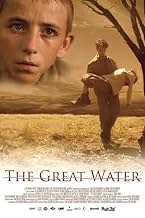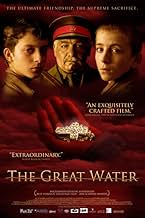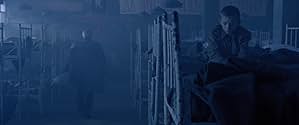Based on a children's book written by Zivko Cingo in the 1970s, the movie is about the difficult transition in Macedonia after World War II.Based on a children's book written by Zivko Cingo in the 1970s, the movie is about the difficult transition in Macedonia after World War II.Based on a children's book written by Zivko Cingo in the 1970s, the movie is about the difficult transition in Macedonia after World War II.
- Awards
- 4 wins & 1 nomination total
Krume Matov
- 2nd Bodyguard
- (as Krume Matev)
Featured reviews
In many corners of Europe, there are tragic stories of early childhood suffered by those who survived the educational atrocities. The novel upon which this film is based, was written by Zhivko Chingo. Entitled, " The Great Water " or " Golemata Voda " in Macdonian, it is the story of Old Lem (Meto Jovanovski) recalling his early youth. Reminiscing his childhood as a boy played by (Saso Kekenovski), he recalls the shocking and abysmal conditions of his socialist's party school where he suffered indoctrination decreed by the Stalinist propaganda. Director Ivo Trajkov, documents the children's gloomy, dreary atmosphere, amid the dark often torturous conditions of the Czeck government's state run orphanages. Deprived of faith, hope and spirit, Lem dreams of freedom are non-existence until he meets Isak Keyten (Maja Stankovska) who's very appearance promises friendship. Under the watchful eyes of the Warden (Mitko Apostolovski) and his aid Komrade Olivera (Verica Nedeska) life is grim at best. Still, Lem believes if he can win friendship in the eyes of Isak, then hope lies in his future. The dark, nearly impregnable prison presents itself as a bottomless pit where all dreams are forbidden. In this movie, the author's worse nightmares are the currency by which children exchange their obedience for a day's existence. ****
Not many movies are made about WW2 that revolve around Russia's point of view, although this movie doesn't really focus much on the war itsself than it does the casualties of war and collateral damage.
Lem is an orphan who is captured by soldiers and put into an orphanage where he and many other orphans are being brainwashed to follow Communism. Being the new kid in the orphanage, he's forced to learn all of the routines that all the other kids already know.
After being there for some time, a new kid arrives by the name of Isak Keyten.
Now all of a sudden Lem doesn't feel so alone and tries his best to befriend the older boy.
The only way he could eventually befriend the boy was to ask the Commander in charge of the orphanage what happened to Isak's girl friend, who had been in the orphanage prior to Isak's arrival.
This movie does a beautiful job of showing how innocence can be lost rather quickly when children are forced to grow up fast in a hostile environment.
Lem is an orphan who is captured by soldiers and put into an orphanage where he and many other orphans are being brainwashed to follow Communism. Being the new kid in the orphanage, he's forced to learn all of the routines that all the other kids already know.
After being there for some time, a new kid arrives by the name of Isak Keyten.
Now all of a sudden Lem doesn't feel so alone and tries his best to befriend the older boy.
The only way he could eventually befriend the boy was to ask the Commander in charge of the orphanage what happened to Isak's girl friend, who had been in the orphanage prior to Isak's arrival.
This movie does a beautiful job of showing how innocence can be lost rather quickly when children are forced to grow up fast in a hostile environment.
10ocenkg
The movie is the story of the little Macedonian kid Lem who fell victim to the 2nd World War by witnessing the loss of his parents. Like so many guys and girls picked from the different parts of Macedonia which was once one of the republics of the Yugoslavian Republic, Lem is brought to an orphanage house which serves as an agent of regimentation. The Socialist regime needs ambitious and well-trained guys and girls who are expected to be die-heart patriots against the Nazist and Fascist threats. Poorly aware of the Socialist training and its consequences, Kim starts to be exposed to the building blocks of socialism.His life starts to change once a mysterious boy steps into the wrecking camp. Kim's curiosity and penchant for being closer to this mysterious boy draw the two characters to chain of irreversible events. Based upon a very famous Macedonian novel, the movie is excellent in the great performance shown by the actors and actresses. The director's way of introducing the story to the viewers is so good.There is only one thing missing in the movie.That's the choice of the music for the movie.I am convinced that the director could choose better music.
Through the witty words of the original recount in the book, as said before, Voemata Goda was originally intended for children. The magic in the book, performed by young Isaac, turns the adaptation for screen into a very different matter.
The story has been already told in some other comments. I guess it's better to give more ideas on other issues that are crucial to the mise-en-scène for the work.
First of all, the absolutely perfect team work of Czechs, Macedonians, Dannish and people from some other countries who contributed to the making of this film. Their superb work is duly translated to the finished film. It's not that often that the use of sound is so chilling and perfect as it is in this film.
The children actors who take the load of the lead roles are perfect. I think somebody said before that because of the almost absence of dialogue, their "being there" in front of the cameras is enough. Really, this is misunderstanding the dramatic effort needed to convey feelings, states of mind and many other facets of the psyche, especially for a child. I should say that their work is believable, natural, engrossing and, in many moments, chilling, never cheesy or overacted. Their work reminisces of certain horrifying films related with the situation depicted here, as in Tòrzok, where the lead role lies on the back of a very young child and makes the film all the more convincing, because he ACTS the way his character is supposed to behave.
This film, as in the book, has many fictional, intimate and surreal scenes. They are committed to the screen very convincingly. The portrayal of a camp from the period it's set in, is accurate.
Maybe there are people who can vote a meager 1 to this film. It's respectable. But, objectively, after reading the comments, it is clear that some people shouldn't be allowed to have any opinion on anything if there's such a deep ignorance that makes them think that. Ignorance doesn't make reality disappear.
This is not a small film. Thank God these films are oriented to people with knowledge of contemporary history and not to the big American audiences.
The story has been already told in some other comments. I guess it's better to give more ideas on other issues that are crucial to the mise-en-scène for the work.
First of all, the absolutely perfect team work of Czechs, Macedonians, Dannish and people from some other countries who contributed to the making of this film. Their superb work is duly translated to the finished film. It's not that often that the use of sound is so chilling and perfect as it is in this film.
The children actors who take the load of the lead roles are perfect. I think somebody said before that because of the almost absence of dialogue, their "being there" in front of the cameras is enough. Really, this is misunderstanding the dramatic effort needed to convey feelings, states of mind and many other facets of the psyche, especially for a child. I should say that their work is believable, natural, engrossing and, in many moments, chilling, never cheesy or overacted. Their work reminisces of certain horrifying films related with the situation depicted here, as in Tòrzok, where the lead role lies on the back of a very young child and makes the film all the more convincing, because he ACTS the way his character is supposed to behave.
This film, as in the book, has many fictional, intimate and surreal scenes. They are committed to the screen very convincingly. The portrayal of a camp from the period it's set in, is accurate.
Maybe there are people who can vote a meager 1 to this film. It's respectable. But, objectively, after reading the comments, it is clear that some people shouldn't be allowed to have any opinion on anything if there's such a deep ignorance that makes them think that. Ignorance doesn't make reality disappear.
This is not a small film. Thank God these films are oriented to people with knowledge of contemporary history and not to the big American audiences.
10dragec
The Great Water represent an absolute summary of the emotional values that Macedonian literature has given us for centuries. An outstanding performance and adaptation of the novel, originally written for children. The structure of the film, unintentionally follows the smooth fabric of Zhivko Chingo's structural approach in writing, and that is something that really amazes me. This is an unbelievable rise of the Macedoian cultural sensibility in means of presenting the potential through a wider view, in a western way, but yet so familiar and authentic. I think that all movie lovers, esp. those enjoying the films of Steven Spielberg, David Lynch and Wim Wenders will love this film, since the film line has similarities to these authors, but, again it is totally authentic.
Did you know
- TriviaThree main locations: the courtyard, the factory and the lake are actually more than 100 miles from each other. Blending all three locations into one was done by very carefully selected camera angles and set pieces.
Details
- Release date
- Countries of origin
- Official sites
- Languages
- Also known as
- Yağmuru Beklerken
- Filming locations
- Production companies
- See more company credits at IMDbPro
Box office
- Gross US & Canada
- $17,257
- Opening weekend US & Canada
- $6,484
- Jun 19, 2005
- Gross worldwide
- $17,257
- Runtime1 hour 33 minutes
- Color
- Sound mix
- Aspect ratio
- 2.35 : 1
Contribute to this page
Suggest an edit or add missing content










